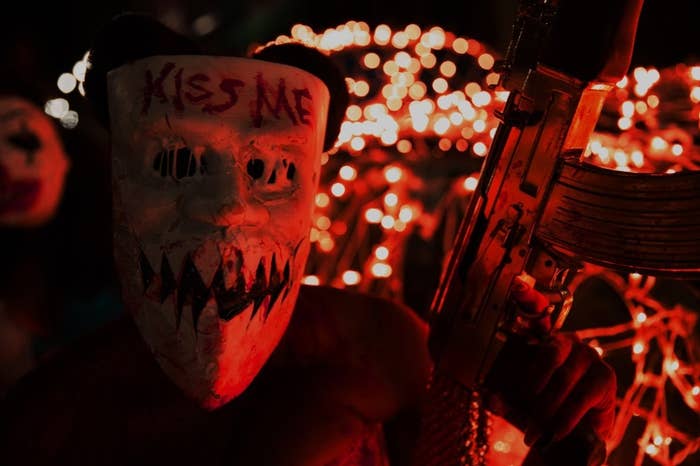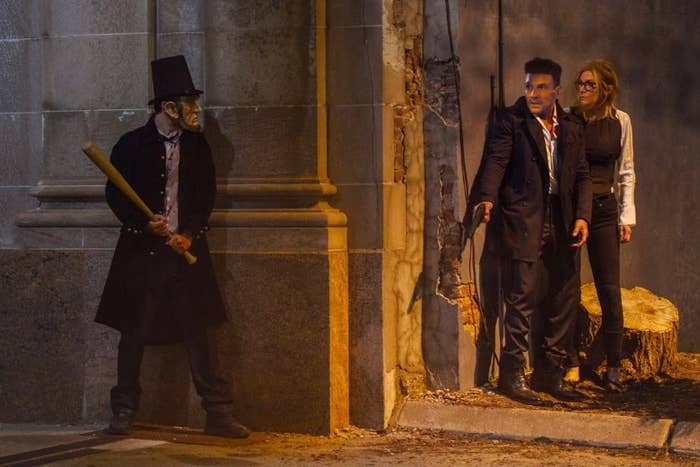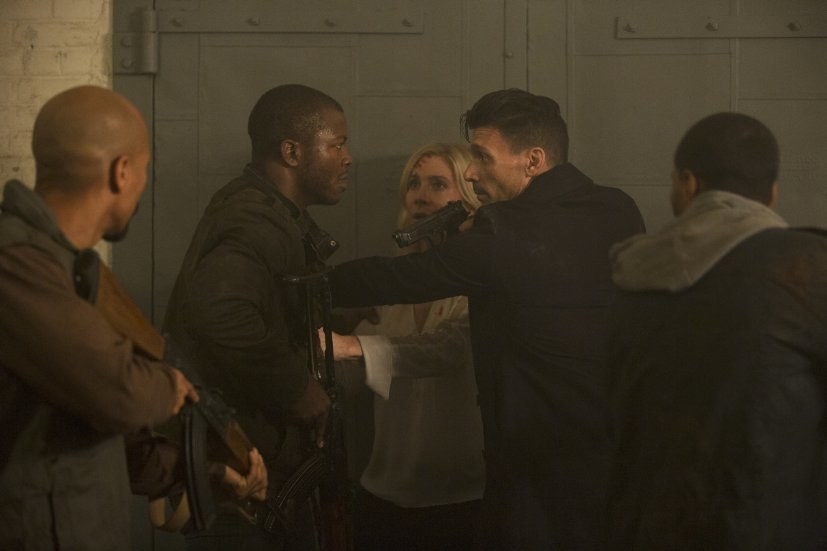
Two candidates are battling for the presidency and the soul of the country in The Purge: Election Year, the latest and most ambitious (though not the best) installment of writer-director James DeMonaco's America-gone-mad series. Like The Purge and The Purge: Anarchy, this film is set in a near-future United States in which, one night a year, murder is not only allowed but government-endorsed. But, like in the U.S. today, the nation in the D.C.-set Election Year is facing a potentially seismic vote. Charlie Roan (Elizabeth Mitchell) is a senator and Purge survivor running for the highest office in the nation on an anti-Purge platform, boldly calling out how the event culls the poor and vulnerable. She poses a real challenge to the incumbent New Founding Fathers of America, the party that started the Purge years before, and the NFFA’s chosen representative, minister Edwidge Owens (Kyle Secor), a forgettable, silver-haired man who blends so seamlessly into the party’s cadaverous boardroom that his suit serves as a sort of camouflage.
In other words, Charlie may be lightly designated as a Hillary Clinton equivalent, but her opponent is not the, er, unique personality that is Donald Trump — Edwidge (Edwidge!) is a blur meant as a stand-in for a more standard conservative stereotype. DeMonaco clearly intended The Purge: Election Year to be his franchise's most timely entry, one that would combine its annual horror show with scathing political commentary, but having written the film a year or two ago, he didn’t guess what (or who) was coming in the 2016 election. Most characters in Election Year are raging against a fictional political party that hides its bloodstained anti-poor, anti-POC ideology behind laughably sanctimonious claims that the Purge is all about spiritual and patriotic betterment. But the film skewers a script that Trump — who doesn’t hide a damn thing about his agenda — has been tearing up for over a year.

The Purge movies have slowly revealed themselves to be based on a nightmare version of dog-whistle politics in which the slaughtering of the urban poor is coded as an act of cleansing and a ceremony for the social good. But the satire of the annual Purge is blunted by an IRL election cycle that’s been rife with open hatemongering. The Purge: Election Year is about how everyone's allowed to try to kill one another one night a year, but it's also about how the rest of the time, most people are, quaintly, keeping up a pretense of unity. The film features colorful carnage — bodies tied to the hood of a car or set on fire outside of a bus stop — but most of it is ultraviolence for the sake of ultraviolence, divorced from motivations that could give them relevance as well as nastiness.
Then again, the Purge movies have always been exasperatingly half-smart, built on a great idea that’s never fully realized, due to budget restraints or inclination. Election Year emphasizes continuity more than the previous films, with Edwin Hodge appearing for the third time and Frank Grillo turning up for a second; the latter, as Leo (previously only known as Sergeant), is Charlie's head of security and her sole protector after things, of course, go wrong in her planned protection detail. The two end up on the street, crossing paths with a group of locals played by Mykelti Williamson, Joseph Julian Soria, and Betty Gabriel. They eventually fall in with a resistance group that provides medical aid to Purge victims, as well as fight against the NFFA and their supporters through sometimes deadly means.

It's the Purge film that feels the biggest, but that's also what makes it the least interesting, given that it explores the consequences of its concept less in order to focus on the battle over whether the Purge should exist at all. Building out a linear narrative is where the series has always been weakest — why, for instance, is Charlie so annoyingly unprepared for the NFFA’s attempt on her life, when they all but announce that’s what they’re going to do? Election Night's raft of characters aren't any more distinguished than in the past installments, and while they're played by more actors of color, that doesn't stop the film from falling into unfortunate, old traditions of who dies first.
In the end, it's Brittany Mirabile as a psychotic schoolgirl who outshines any of the film's attempts at political allegory, as she sports bloody lingerie and an automatic weapon stepping out of a car blaring Miley Cyrus's "Party in the U.S.A." She’s not an analog for a politician leveraging religious and nationalist fever to cement personal power, or for capitalism run amok, or for any of the other equivalents that The Purge: Election Year flirts with but doesn’t really commit to. She’s just a teenager on a tear with a high body count, a schlock icon in the making. Her arrival is just as enjoyable as when she’s inevitably mowed down, which highlights the exact sort of inexact pleasures that the Purge series has perfected.
